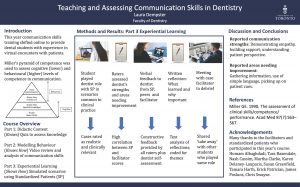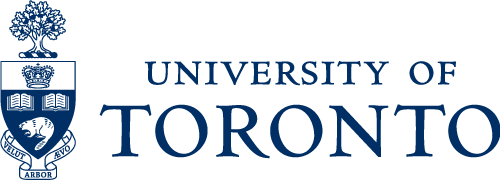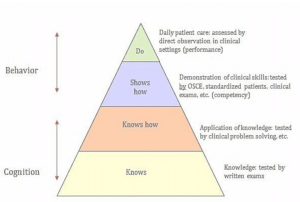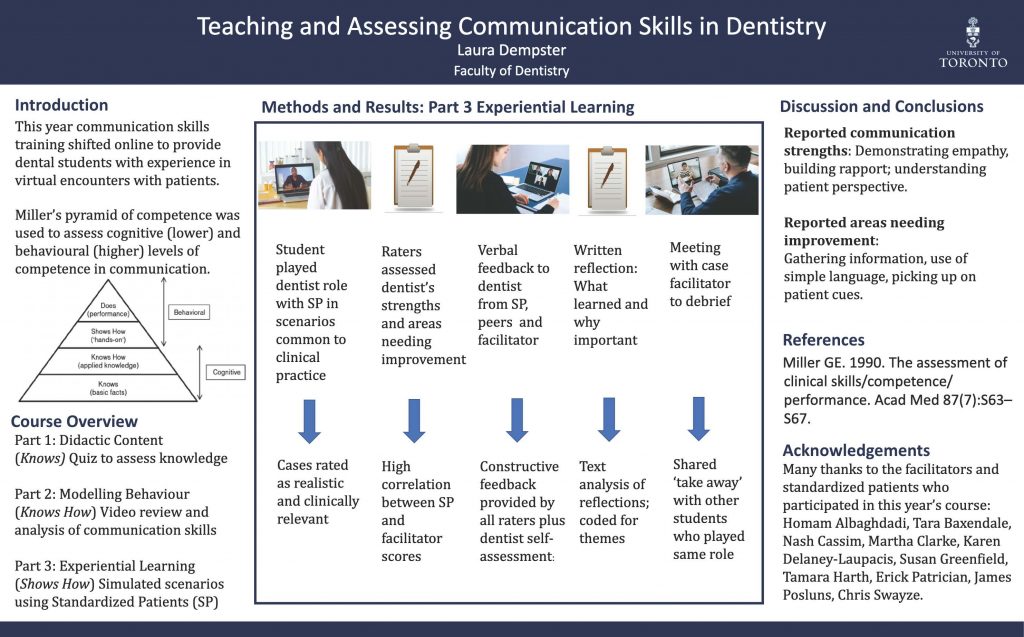Laura Dempster
Course/ProgramDEN202Y – Communication Skills |
 Poster and Video Presentation – Teaching and Learning Symposium, May 2021 Poster and Video Presentation – Teaching and Learning Symposium, May 2021 |
Design Context
DEN202Y Communication Skills is taught in the 2nd year DDS (Doctor of Dental Surgery) program at the Faculty of Dentistry (n=120 students). The course teaches students about the importance of communication in health care and provides practice communicating in simulated scenarios using role-playing with standardized patients (SPs).
The course includes 3 components:
- Part 1: Didactic Content – Synchronous sessions provide evidence-based communication content and assessment of knowledge.
- Part 2: Behavioural Modelling – Students review and analyze video recorded communication between clinicians and patients.
- Part 3: Experiential Learning – Students play the role of the dentist in one-on-one conversations with SPs in a variety of scenarios common to clinical practice.
This year the program was delivered online and utilized Quercus Learning Analytics (LA) in various aspects of the course.
Instructional Challenge
DEN202Y shifted to a fully online format this academic year and currently utilizes assessments at Miller’s first three levels, namely content knowledge at level 1 ‘Knows’; application of knowledge in analyzing video recordings at level 2 ‘Knows how”; and demonstration of communication skills at level 3 ‘Shows how’. At this time, evaluation of communication skills in real-time with clinical patients is not done. Consequently, it is not known whether students effectively transfer the knowledge and skills acquired in DEN202Y when providing clinical care (Miller’s level 4 – ‘Does’).
Design Strategy
DEN202Y is a pass/fail course with attendance and participation required for successful completion. Given the emphasis on active learning, feedback is a key element in the course with Miller’s pyramid used to scaffold the formative feedback components in the course. The feedback focuses on assessment of the student’s knowledge, attitudes, and skills observed during their conversation in the simulated patient encounters. Miller’s level 1 (‘Knows’) assessment uses a quiz to test knowledge after the didactic content component of the course. The level 2 (‘Knows how’) assessment requires students to analyze communication skills in a posted video recording, which is followed by an online class discussion to confirm observations. The level 3 (‘Shows how’) assessment evaluates the student/dentist’s communication skills after their conversation with the SP using a variety of types of feedback. A scoring rubric on Quercus is completed by all raters who observed the conversation (i.e., the facilitator, SP, and three peer observers), and used by the student/dentist to self-assess their skills. A report is generated by Quercus LA that conveys scores from raters and the student/dentist which is subsequently analyzed to assess differences between raters. The next assessment involves the aforementioned raters providing verbal feedback to the student who played the role of the dentist. This is always offered in a respectful constructive manner and combines comments and suggested improvements. The final assessment is a written reflection in which the student/dentist comment on their learning experience in their conversation with the SP. The student/dentists for each case then meet with the facilitator for their case to debrief further.
Use of Data to Inform Design Iteration and Instruction
Due to this year’s shift to online teaching, students reviewed asynchronous content and assessed video recordings of clinician/patient interactions in preparation for the online experiential sessions with the SPs. Quercus LA allowed assessment of student engagement by tracking student views of course content and completion of assigned tasks (quiz, video review, reflection). Raters’ scores were compiled on Quercus and analysis provided insight into students’ communication skills. As well, text in the written reflections was analyzed and coded to identify themes emerging from the students’ reflection on their communication skills. These data provided insight into areas of greater challenge, informing future course iterations as well as identifying areas of focus in subsequent years.
Next Steps
Quercus LA will be used to generate reports of students’ communication strengths and areas needing improvement based on rater scores, student self-assessment scores, and written reflections. This will inform future iterations of the DEN202Y Communication Skills course. These data could also be used in my 3rd year DEN308Y Behavioural Science course to identify communication skills that need reinforcement, both in general and for individual students. Interest also lies in having students revisit their communication data in 3rd year as a point of reference for a communication assignment in my DEN308Y Behavioural Science course.
Poster
Presented at the Teaching and Learning Symposium, May 2021.
Click to download poster PDF in a new tab


